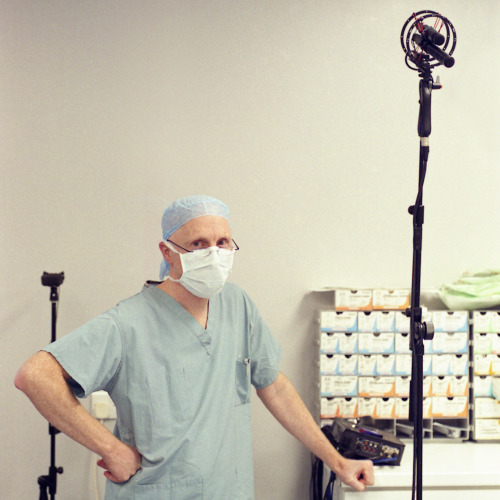Five Sound Questions to John Wynne
 Picture by Tim Wainwright.
Picture by Tim Wainwright.
Last week we saw John Wynne’s 300 Speakers, Pianola and Vacuum Cleaner, and also new site-specific works for “The Flux, and I” which is on in London until the 22nd of June. The delicate sounds of the huge installation were quite intriguing, so I am quite honored to have him answer the Five Questions.
1. What sound from your childhood made the most impression on you?
I remember being 8 or 9 years old and living in Cold Lake, in Canada, running around at night with a couple of friends, unscrewing Christmas light bulbs outside people’s houses and stamping on them while they were still hot, just to hear the popping sound they made. I’m not sure whether the physics is right, but it seemed to us that the sound was louder because the bulbs were hot and it was very, very cold outside. But what I also remember, as much as the sound, was that I felt guilty about this experiment in vandalism and immediately told my mother about it. Much to her credit, I wasn’t punished, I guess because I obviously recognised that it was wrong and clearly had no intention to go on to a life of social irresponsibility. But just writing about this has triggered a forgotten memory from around that time in my life: we were living on the air base at Cold Lake, and there was a loud siren that went off at night to mark a curfew for children under a certain age. It also went off when they were about to fly over the base spraying insecticide, which I’m sure was very unhealthy, given that this was decades ago. I wonder if that sound, a classic air-raid type siren, had anything to do with my later fascination for alarm sounds: I’ve designed many auditory warnings for installations and other sound works over the years.
2. How do you listen to the world around you?
Sometimes it seems like the world of sound art is a competition to see who can be the most sensitive listener. I think I’d go mad if I were hypersensitive to sound all the time. In fact, when I was younger I suffered from tinnitus, and I had lots of hearing tests and brain scans which revealed nothing wrong, physiologically. Then I read Cage’s account of his experience in the anechoic chamber and realized that at least part of my problem was that there was a feedback loop between listening to the sounds of my own body and worrying about what I was hearing – the more I worried, the louder it got. I try to be attentive to my environment and prepared to notice interesting transient sounds when they happen, but sometimes I turn my attention elsewhere. While I was making the two site-specific installations at Gazelli Art House recently, I began by opening myself up to sound, including the ambient sounds of the gallery and the street outside, but by the end of the process, a week or so later, I was completely numb and once the work was done I didn’t want to hear anything at all for some time.
3. Which place in the world do you favor for its sound?
There’s a secluded lake in Canada where my partner and I spend a lot of time when we go back in the summer. You have to hike in to it, there are no occupied houses around it, and no boats are allowed, so it’s exquisitely peaceful. The lake is surrounded on two sides by tree-lined cliffs and is set in a naturally bowl-shaped landscape, so when the geese and other water birds come and go the echoes of their voices and the sounds they make landing and taking off are extraordinary. Even when teenagers arrive on holiday weekends to risk their lives on the massive rope swing on the other side of the lake, the way the sound of their shouts and splashes travels slowly across and around the lake is so interesting it almost makes up for the intrusion. But of course it’s not just the sound that I love about this place – the water even feels better than anywhere else I know and is so clean you can drink while you swim.
4. How could we make sound improve our lives?
Make less of it. Ever since Hildegard Westerkamp mentioned it to me years ago, I’ve noticed that as I get older, the frequency range of my hearing shrinks but at the same time I become more sensitive to high sound pressure levels. The noise in some public places is intolerable for me at times, yet if I compare my hearing to that of my students, who have no problem functioning in noisy environments, some of them find very high frequencies (that I hear only faintly or not at all) quite painful. Age-related hyperacusis (reduced tolerance to noise) is compounded by a decreased ability to ‘focus’ on a single voice in noisy environments. I do appreciate ‘noise’ aesthetically sometimes and some of my own work gets pretty intense at times, but these days I’m generally more interested in the lower threshold of hearing than the upper.
5. What sound would you like to wake up to?
I love Rutger Zuydervelt’s response to this question: Fuck it, I’m going to answer with the most cliché answer ever. I’m afraid birdsong was the first thing that came to my mind, too. Shortly followed by the sound and smell of coffee wafting around me on a light, warm breeze.
Thanks John! Also read the answers of other artists in the Five Sound Questions section.




 Monday, June 2, 2014 at 16:14
Monday, June 2, 2014 at 16:14
Reader Comments